‘Bharat Bandh’: Indian farmers launch strike to press for demands
Farm associations and trade unions launch one-day nationwide general strike to demand rollback of agriculture laws they say will hurt their livelihood.
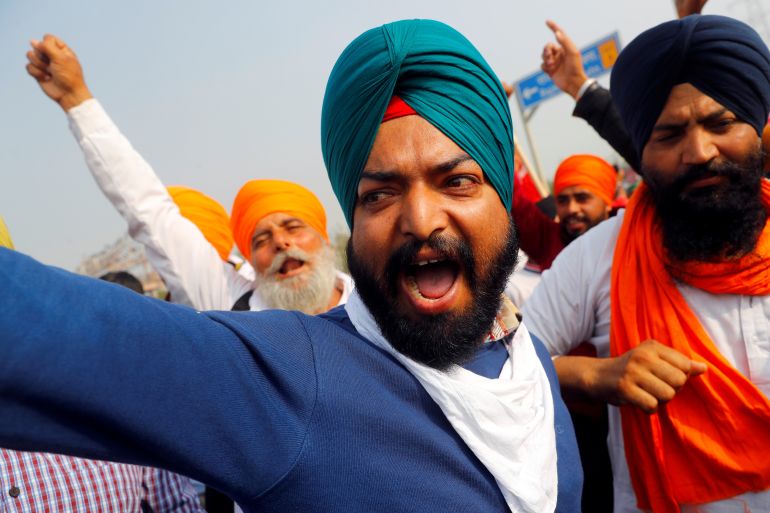
New Delhi, India – Tens of thousands of Indian farmers camping on the outskirts of the capital city, New Delhi, for more than a week have launched a “Bharat Bandh” (nationwide general strike) to demand the scrapping of three farm laws they say will hurt their livelihood and benefit only corporations.
Farmer leaders say the laws are pro-corporate and will gradually lead to the government withdrawing the current guaranteed price mechanism under which it buys agricultural produce from farmers.
Keep reading
list of 4 itemsIndia summons Canadian envoy to complain about Trudeau’s remarks
Indian farmers vow to intensify protests after talks fail again
In India’s Assam, a young Muslim leader fights election to unite
Prime Minister Narendra Modi has defended the three laws passed in September, saying they will boost private investment in the moribund agriculture sector and boost farm income.
Thousands of farmers, mostly from the “grain bowl of India” in the northern states of Haryana and Punjab, have blocked three key highways linking Delhi to neighbouring states and refuse to move until the government accepts their demands.
It is not just Punjab and Haryana that have farmers unhappy with these laws. “Protest against the farm laws are going in every state,” Hannan Mollah, a Communist Party of India (Marxist) leader and general secretary of the All India Kisan Sabha, told Al Jazeera.
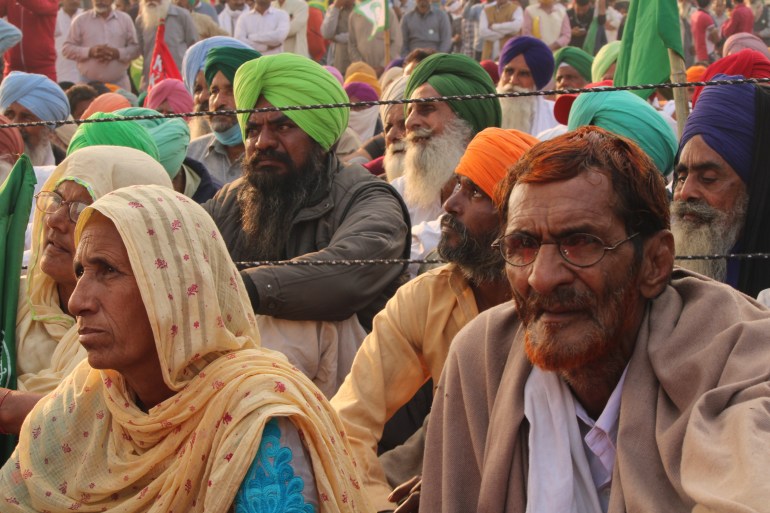
Farmer associations and trade unions from other regions have joined the agitation and opposition parties declared their support for one of the biggest protests in decades.
“As many as 475 unions of farmers from all the states and union territories have supported the call for the Bharat Bandh,” said Darshan Pal, a farmer leader who has participated in talks with the government.
“We have given this call for shutdown to put more pressure on the government and we the farmers’ organisations are hopeful that the government will accept our demands and revoke the laws.”
Roads and rail lines were blocked across the country despite deployment of police in Delhi and other parts of the country.
The governing Bharatiya Janata Party (BJP) accused opposition parties of opportunism, while Delhi Chief Minister Arvind Kejriwal’s Aam Aadmi party (Common Man Party) claimed the Delhi chief minister had been placed “under house arrest” to prevent him from joining the protests. Kejriwal visited Singhu protest site near Delhi border on Monday.
‘Revoke the laws’
Five rounds of talks between the government and representatives of the farmers have failed to break the deadlock as farmers refuse to accept anything less than the scrapping of the three laws and assurances of a guaranteed minimum support price for their produce.
The government has so far stood its ground, saying the new laws will “liberate” farmers from the tyranny of middlemen.
Nalin Kohli, spokesman for the governing Bharatiya Janata Party (BJP), believes talks will resolve the biggest crisis facing Modi.
“Senior ministers from the government have been meeting representatives and leaders to allay their fears and find a solution,” he told Al Jazeera.
However, as Sansar Singh, a farmer from Punjab, says: “We don’t want any discussion on the amendment of the three laws, we are here simply to convey to Narendra Modi to revoke the laws. There is no politics in it, we feel the laws are going to benefit corporates and not poor farmers like us.”
India’s agriculture sector, which employs more than half of India’s 1.4 billion people, has been facing a crisis, driving thousands of debt-ridden farmers to take their own lives.
The protesters have other demands, one being that the government stop fining farmers for clearing their fields by burning the stubble left behind by their wheat crops – considered the main source of air pollution in Delhi during the winter months – arguing that the government should subsidise the clearing of fields or stop fining the burning. They also want the withdrawal of this year’s Electricity Bill, which they fear will push power bills higher.
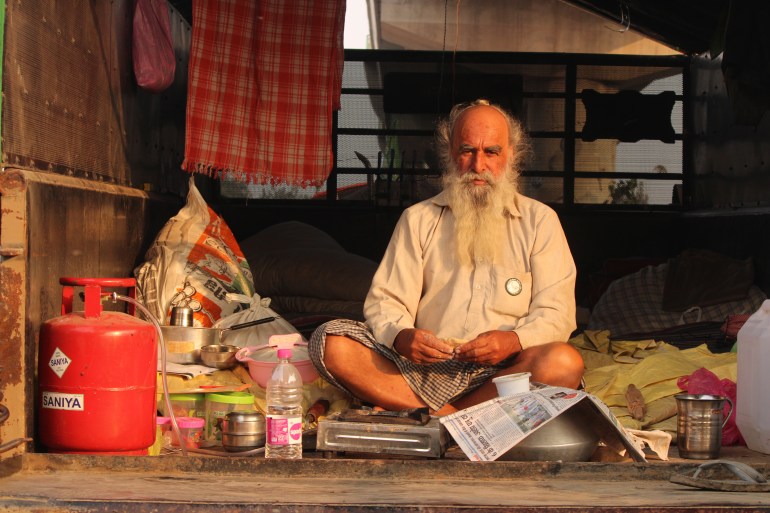
“This anger that we see now is basically a culmination of what has happened in the past… being channelised against the central laws that have been brought in,” said Devinder Sharma, a food security analyst.
“The anger is primarily because agriculture has been denied its rightful income all these years. The loud messages from this movement is that farmers are actually crying for an assured price.”
Delhi border blocked
Satbir Singh, 60, left his home in Faridkot district of Punjab two weeks ago to take part in the protests in New Delhi.
It took him and thousands of other Punjabi farmers two days to cover the distance of about 370km (230 miles), which normally takes six hours, as police in Haryana state – which they had to pass through and is governed by Modi’s BJP – set up roadblocks and fired tear gas and water cannon to try to stop them.
Since November 26, Singh, along with thousands of other farmers, has been at Tikiri on the Delhi-Haryana border, where hundreds of police and Rapid Action Force (RAF) personnel have cut off the road with metal barricades, cement blocks and several bulldozers. Riot control vehicles are stationed at the site.
It is easy to tell that the farmers also mean business, and they are settling in for the long haul.
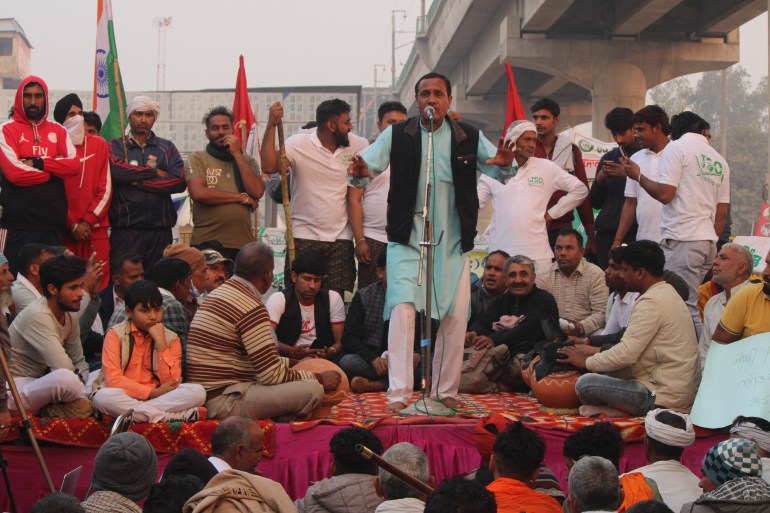
They sleep in hundreds of trolleys attached to tractors lined up on the highway for several kilometres and eat food prepared in hundreds of “langars” (open kitchens) by volunteers.
A makeshift stage has been erected for speakers while the farmers – men and women of all ages – sit on mats to listen.
In light of the coronavirus pandemic gripping India and the world, volunteers offer free masks to protesters while doctors from Punjab have set up free medical camps for the agitating farmers.
The scene at the Singhu and Ghazipur borders, two other main protest sites, is no different.
“We will continue to protest unless the government accepts our demands,” said 60-year-old Singh, as he prepared food for himself in a tractor-trolley.
Singh has been growing rice and wheat on his family’s 3.2-hectare (eight acres) plot and believes the laws will have a huge impact on his livelihood, saying: “Modi government has to bend… We will not leave unless our demands are fulfilled.”
He added that protesting is costing them dearly, but that they would continue their stance against the “black laws”.
The contribution of agriculture has been dwindling over the years, with successive governments failing to address the problems facing the sector, which contributes nearly 15 percent to the country’s $2.9-trillion economy.
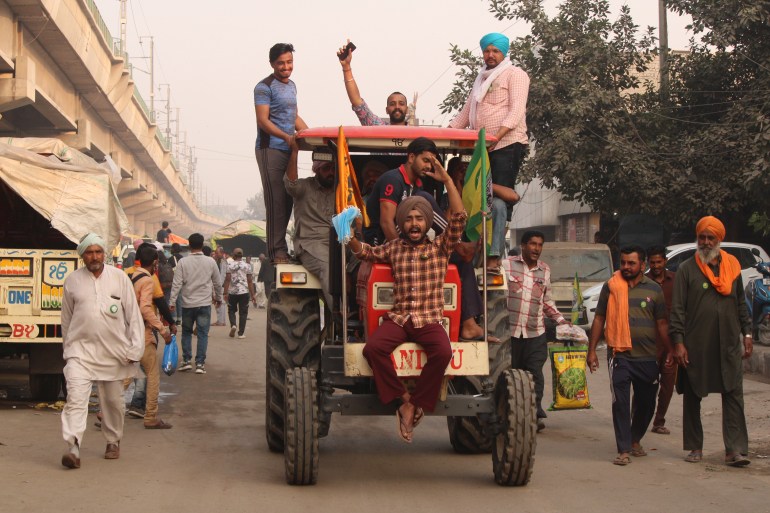
‘This government doesn’t care’
Leaders from the ruling party, including Modi, have dismissed the concerns raised by farmers, saying the farmers have been misled by opposition parties, which in turn have accused Modi of working to benefit corporations.
The government says the existing farm markets, or “mandis”, benefit middlemen and prevent farmers from getting better prices in the private market.
But analysts and farmer leaders warn that, at a time of unprecedented economic decline, leaving the farmers at the mercy of market forces may not work and the government should support the agriculture sector which underpins India’s food security.
India’s economy has plunged into its worst recession in nearly 30 years due to the effect of the coronavirus pandemic, with gross domestic product (GDP) contracting by 7.5 percent and recovery expected to take time.
“The private market system which the government is trying to create through these laws will give benefits to farmers in the first few years because they would be exempted from taxes which would lead to increase in prices of crops,” said farmer Kanwaljeet Singh, 37.
“But once farmers stop going to the APMC mandis, the private players will control everything. Whatever price they will offer, a farmer will have to sell its produce,” he told Al Jazeera.
“The government should have first discussed these laws in detail with agriculture experts, farmer leaders and try to find out what impact these laws are going to have and then take a decision accordingly,”
“But this government doesn’t care.”